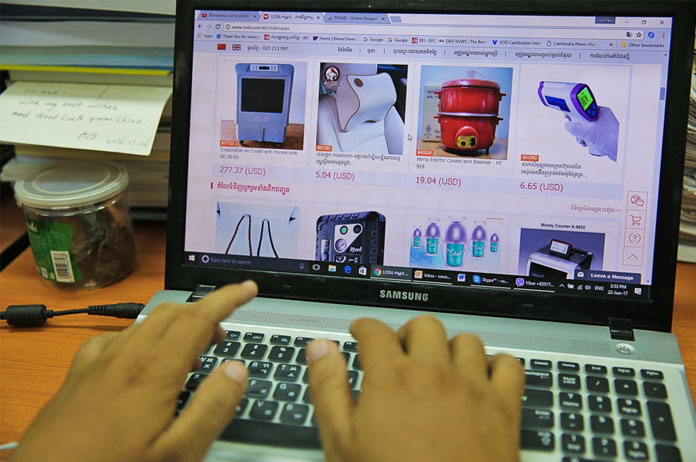Cambodian Shopping Just A Mouse Click Away

One thing online shoppers love is the luxury of selecting things they want on the web, with the click of a mouse, in the comfort of their home or the familiarity of their workplace.
For shoppers like 30-year-old Nou Bunthon in Phnom Penh’s Toul Kork district, it means avoiding the area’s notorious traffic jams. “The traffic jams in Toul Kork are just horrendous, and I don’t want to be stuck on the road just going around the corner to buy a dress or any fashion item I like for my weekend outing,” Bunthon told the Khmer Times. “That’s the reason I like shopping online through Facebook. The clothes are all well displayed with the prices, and I can take my time looking at them before I make a decision. The prices are fixed, and there is no haggling,” she added.
Facebook announced last July that it was testing the waters with adding digital storefronts and buy buttons to retailers’ pages. Now, after partnering with e-commerce platform Shopify, shopping on Facebook has become a reality. “The Shop,” as it’s called, lets merchants display products directly on their company Facebook page. Retailers can also choose whether they want customers to be able to buy products directly on their Facebook page or if they will be redirected to the company’s store or app after clicking the buy button.
Adding a “Shop” section to one’s Facebook page also makes it easy for netizens to become entrepreneurs. Nhik Soleaphy is a government employee, but he also owns an online business selling shoes and bags on Facebook. “I like marketing on Facebook because I can connect with people in a language that sounds real and likeable. It suits my style of business, which I can run from my smartphone or iPad,” he said. “Creating a Facebook page for your business is a relatively simple process. In fact, it’s so easy and affordable that many small businesses are now using Facebook pages rather than establishing a website.” With a grin on his face, he said, “You also don’t need government approval for it.”
While other ASEAN members have a thriving e-commerce sector, Cambodia has yet to have a law on electronic transactions. But that is set to change. Cambodia’s first electronic commerce, or e-commerce, law could be reviewed and passed by the National Assembly by the end of the year. The draft e-commerce law has 12 chapters that are divided into 90 articles. It covers details of credit and debit card usage to the use of online signatures to purchase goods over the internet. The draft law also has rules for trading companies to ensure the security of consumers when making online payments.
On Wednesday, the National Bank of Cambodia announced that all payment service providers in the kingdom will have to apply for an operating license in compliance with the bank’s new order issued to protect online customers against the risk of fraud. The NBC’s new order will affect all registered firms providing retail outlets online services for accepting electronic payments by a variety of payment methods. The payment methods include credit card and bank-based payments such as direct debit and bank transfer.
Despite the government’s efforts to protect online customers against credit card theft or fraud, many online merchants are still in the dark about the soon-to-be-enacted e-commerce law. “I really don’t know about the e-commerce law. But what I know, as a person who has an online business, is that I must maintain my customers’ trust always,” said Huy Sovann, a marketing and sales officer at Loda, an online shopping company in Phnom Penh. “Online sales revenue can be lost because of shoppers’ fears. We’re constantly trying to build trust in our online products and trying to stop people from bouncing away before they have even browsed what is on offer,” he added.
Im Vutha, spokesman at the Telecommunication Regulator of Cambodia, said in the absence of adequate monitoring systems and controls in the form of an e-commerce law, online merchants could be facilitating unauthorized transactions or unfair or deceptive practices resulting in financial harm to the consumer. “The potential for misuse or fraud exists in all payment channels, so online shoppers have to be careful,” he said.